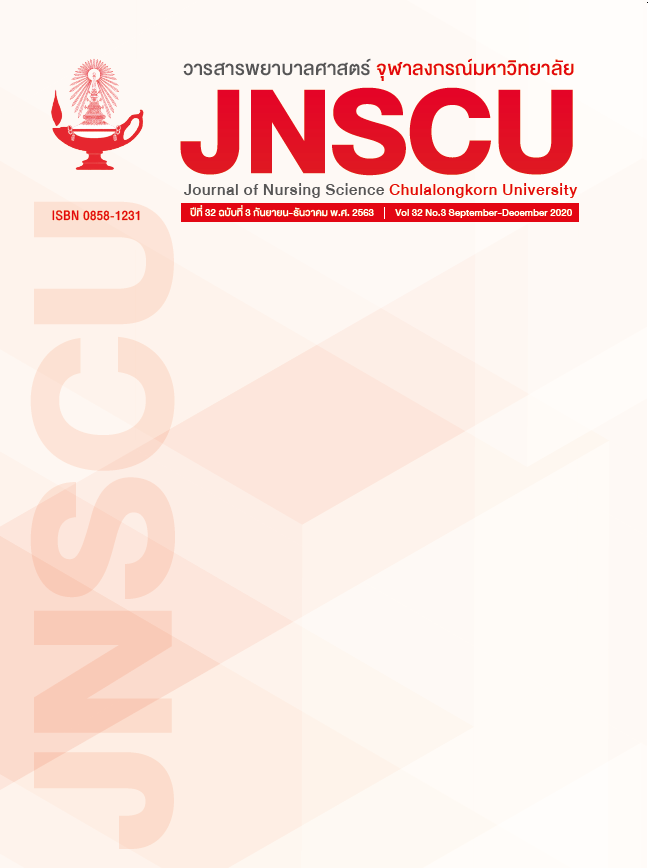ผลของโปรแกรมการเสริมพลังครอบครัวต่อความรู้และทักษะในการดูแลผู้ป่วย โรคหลอดเลือดหัวใจ
คำสำคัญ:
การเสริมพลังครอบครัว, ทักษะในการดูแล, โรคหลอดเลือดหัวใจบทคัดย่อ
วัตถุประสงค์: เพื่อศึกษาผลของโปรแกรมการเสริมพลังครอบครัวต่อความรู้และทักษะในการดูแลผู้ป่วยโรคหลอดเลือดหัวใจ
รูปแบบการวิจัย: การวิจัยกึ่งทดลอง
วิธีดำเนินการวิจัย: กลุ่มตัวอย่างเป็นผู้ดูแลบุคคลในครอบครัวที่ป่วยเป็นโรคหลอดเลือดหัวใจ ในเขตอำเภอเมือง จังหวัดบุรีรัมย์ ซึ่งมีคุณสมบัติตามเกณฑ์ โดยได้รับการจับคู่ (Matched pair) และการสุ่มเข้ากลุ่มทดลองและกลุ่มควบคุม จำนวนกลุ่มละ 21 คู่ กลุ่มทดลองได้รับการเข้าร่วมโปรแกรมโปรแกรมการเสริมพลังครอบครัว เป็นระยะเวลา 4 สัปดาห์ เครื่องมือที่ใช้ในการทดลอง ประกอบด้วยโปรแกรมการเสริมพลังครอบครัวที่พัฒนามาจากแนวคิดการเสริมพลังครอบครัวของ Hulme เก็บข้อมูลโดยใช้แบบประเมินความรู้การดูแลผู้ป่วยโรคหลอดเลือดหัวใจและแบบประเมินการรับรู้สมรรถนะแห่งตน มีค่าความเที่ยงสัมประสิทธิ์แอลฟาครอนบาค เท่ากับ .96 วิเคราะห์ข้อมูลโดยใช้สถิติทดสอบที
ผลการวิจัย: ภายหลังการทดลอง กลุ่มที่ได้รับโปรแกรมการเสริมพลังครอบครัวมีคะแนนความรู้การดูแลผู้ป่วยโรคหลอดเลือดหัวใจ และการรับรู้สมรรถนะแห่งตนต่อการดูแลผู้ป่วยโรคหลอดเลือดหัวใจสูงกว่ากลุ่มควบคุมอย่างมีนัยสำคัญทางสถิติที่ระดับ .001
สรุป: การวิจัยนี้แสดงให้เห็นว่าโปรแกรมการเสริมพลังโดยการมีส่วนร่วมของครอบครัว จะช่วยสร้างเสริมสมรรถนะของผู้ดูแลให้สามารถดูแลผู้ป่วยได้อย่างมีประสิทธิภาพได้
เอกสารอ้างอิง
2. Buriram Provincial Statistical Office. Buriram provincial statistical report. Buriram: Buriram Provincial Statistical Office; 2019.
3. Smith Jr SC, Benjamin EJ, Bonow RO, Braun LT, Creager MA, Franklin BA, et al. AHA/ACCF Secondary Prevention and Risk Reduction Therapy for Patients With Coronary and Other Atherosclerotic Vascular Disease: 2011 Update: A Guideline From the American Heart Association and American College of Cardiology Foundation Endorsed by the World Heart Federation and the Preventive Cardiovascular Nurses Association. Journal of the American College of Cardiology 2011; 58(23): 2432-46.
4. Ryan P, Sawin K. The individual and family self-management theory: Background and perspective on context, process, and outcomes. Nurse Outlook 2009; 57: 217-225.
5. Bandura A. Self-efficacy: Toward a unify theory of behavior change. Psychol Rev 1977; 84:191-215.
6. Chaiwong C, Duangpaeng S, Masingboon K. Factors influencing self-management behaviors among acute myocardial infarction patients. Thai Pharm Health Sci J 2014; 9(3):112-119.
7. Kasemkitwattana S. & Prison P. Chronic Patients’ Family Caregivers: A Risk Group
That Must Not Be Overlooked. Thai Journal of Nursing Council 2014; 29(4): 22-31.
8. Hulme PA. Family empowerment: a nursing intervention with suggested outcomes for families of children with a chronic health condition. J Fam Nurs 1999; 5(1): 33-50.
9. World Health Organization. Ottawa Charter for Health Promotion. November 17-21,1986.
Ottawa, Ontario Canada. [cited 2020 Mar 22]. Available from http://www.phac-aspc.gc.ca/ph-sp/docs/charter-chartre/pdf/charter.pdf.
10. Sanprasan P, Wattradul D, Jamsomboon K, et al. Effects of Health Volunteer’s Capacity Building based on Participating Learning Program on Knowledge and Skill of Caring Patients with Cardiovascular Disease and a Risk Group of Cardiovascular Disease. Thai Journal of Cardio-Thoracic Nursing 2015; 26(1): 119-132
11. Pongaumpai P, Hoontrakul S, Roojanavech S. The Effects of Family Empowerment Program on Fall Prevention Capabilities of the Elderly. Royal Thai Navy Medical Journal 2018; 45(2): 311-327.
12. Naewbood S. Effects of Empowerment program on Self-care Ability of a Family Caregiver. Journal of Nursing and Education 2015; 8(4): 30-40.
13. Punasiri S, Rodpal J, Treerapee S and Chantamun W. Effect of Empowerment Program Applied on Caregiver Competence of Stroke Caregivers. Journal of Nursing Division 2009; 36(3): 47-57.
เผยแพร่แล้ว
ฉบับ
ประเภทบทความ
สัญญาอนุญาต
ลิขสิทธิ์ (c) 2022 วารสารพยาบาลศาสตร์ จุฬาลงกรณ์มหาวิทยาลัย

อนุญาตภายใต้เงื่อนไข Creative Commons Attribution-NonCommercial-NoDerivatives 4.0 International License.
##default.contextSettings.thaijo.licenseTerms##


